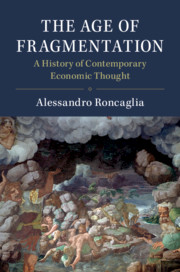Crossref Citations
This Book has been
cited by the following publications. This list is generated based on data provided by Crossref.
Tonveronachi, Mario
2020.
Ages of financial instability.
Journal of Post Keynesian Economics,
Vol. 43,
Issue. 2,
p.
169.
Roncaglia, Alessandro
2022.
Is There a Way to Overcome Fragmentation? A Comment on Matthew Smith’s Review Article.
History of Economics Review,
Vol. 82,
Issue. 1,
p.
77.
Costantini, Orsola
2022.
Financial Markets in Perspective.
p.
177.
Sturn, Richard
2022.
Ideology, power, and progress: Economics and its dilemmas.
Acta Oeconomica,
Vol. 72,
Issue. S1,
p.
81.
Biggiero, Lucio
2022.
The Relational View of Economics.
p.
43.
Roncaglia, Alessandro
2022.
Financial Markets in Perspective.
p.
3.
Dvoskin, Ariel
and
Trabucchi, Paolo
2022.
Pasinetti and the Classical Keynesians.
p.
79.
Smith, Matthew
2022.
Economics: A Fragmented and Troubled Scientific Discipline? A Review of Alessandro Roncaglia’s The Age of Fragmentation: A History of Contemporary Economic Thought (2019).
History of Economics Review,
Vol. 82,
Issue. 1,
p.
55.
Fontana, Magda
and
Iori, Martina
2023.
The Fragmentation of the Mainstream and Communication in Economics: A View from the Top.
OEconomia,
p.
323.
Togati, Teodoro Dario
2023.
The ‘General Theory 4.0’ research programme: macroeconomics when Keynes eventually escapes Debreu and meets Ulysses and Einstein.
Cambridge Journal of Economics,
Vol. 47,
Issue. 1,
p.
171.
Corsi, Marcella
and
Zacchia, Giulia
2023.
Teaching Heterodox Economics in a Feminist Perspective by Using Students’ Written Diaries on Consumption.
Review of Political Economy,
Vol. 35,
Issue. 3,
p.
634.
Biggiero, Lucio
2024.
Cooperation in Value-Creating Networks.
p.
61.
Ambrosino, Angela
Cedrini, Mario
and
Davis, John B.
2024.
Today’s economics: one, no one and one hundred thousand.
The European Journal of the History of Economic Thought,
Vol. 31,
Issue. 1,
p.
59.
Varela-Vázquez, Pedro
and
De Francisco, Carlos
2024.
Regional economic development in the lens of the dilemma between growth poles approach and the balanced growth theory. An observatory during the Francoist regime.
Iberian Journal of the History of Economic Thought,
Vol. 11,
Issue. 1,
p.
31.
Louro, Rosana
Cruz-e-Silva, Victor
and
Almeida, Felipe
2024.
François Divisia in between rational economics and the establishment of the Econometric Society.
The European Journal of the History of Economic Thought,
p.
1.



